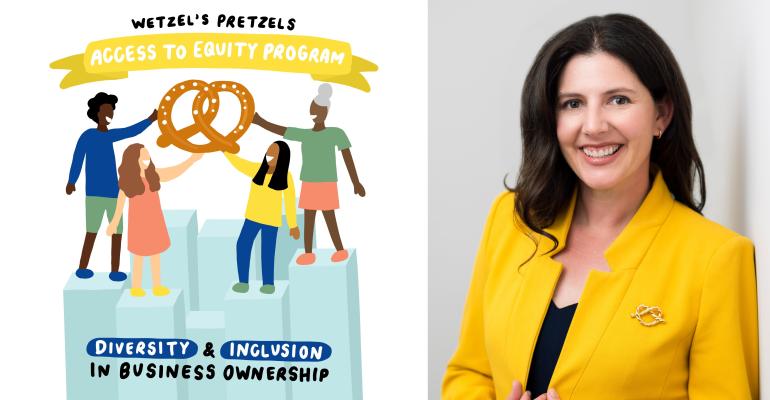Historically, the franchising business has been dominated by men: according to the International Franchising Association’s latest data from 2019, less than one-third of franchises (30.6%) are owned by women. But that’s a statistic that Wetzel’s Pretzels is looking to change through its new Access to Equity program, which aims to increase franchise ownership for women and minorities through financial assistance, as well as educational and mentorship opportunities. Led by the Pasadena, Calif.-based snack brand’s first female CEO, Jennifer Schuler, the equity program will be launching with its first two franchisees within the next month.
“Most franchisees in this business are predominantly male—either white American male or male immigrants,” Schuler said. “[…] Women and people of color structurally have a harder time getting loans, or they usually get lower loans with higher rates. That makes it more challenging to get the investment dollars together to be able to start up a business and it puts a higher threshold on the performance of that business.”
The Wetzel’s Pretzels Access to Equity Program has been in the works for two and a half years. The lightbulb moment for the company happened — like for so many Americans — after the murder of George Floyd in May 2020, especially since the woman who recorded his death was an employee at Wetzel’s Pretzels. Between the pandemic and the social justice movement sweeping the nation, Wetzel’s Pretzels wanted to take a step back and figure out ways to contribute to change beyond just the typical big dollar donations. And what better way for a quick-service restaurant brand to do that than to empower women and BIPOC to become entrepreneurs?
Although franchise education programs for women and minorities exist already in many larger restaurant and retail chains, Schuler said that she believes their franchise equity program is unique because it tackles several hurdles women and people of color might face when trying to start a business, including financial, educational, and access to networking.
Schuler is hoping that the program becomes a copycat model for other companies in the industry.
“If we can create a model that works and it works for other franchisors, then the rising tide will lift all boats,” Schuler said. “When you support the underserved entrepreneur and help them grow, it supports your business too.”
As the program launches, right off the bat, women and people of color get a discount on their franchise fee. For people who might be a good cultural fit for Wetzel’s Pretzels but may not have access to capital or their credit score may not be quite up to par, they move on to the second level of the program, which gives them access to business training and education in partnership with financial empowerment nonprofit, Operation HOPE. Besides Operation HOPE, Wetzel’s is working with other partners including major banks and Brookfield Property Partners to help teach entrepreneurship classes on how to negotiate a lease.
Then, after they brush up their Business 101 skills, Wetzel’s puts program participants in touch with grant financing partners to navigate business loans, and pairs them with franchisee mentors within the company to guide them on their entrepreneurial journey. Additional financial boosts include a discount on royalties’ fees for the first year, as well as vendor discounts on initial product orders like Pepsi.
“You can teach someone to fish, but they also need a pole,” Schuler said. “I saw a lot of folks teaching fishing and not enough people handing them poles. […] I want to keep striving to find more capital partners in this area. I want to keep striving to work with our vendors to keep costs down.”
The first franchisees will be “graduating” from the franchisee equity program to store ownership next month, Schuler said, including Daintry McFadden, a Black entrepreneur who will be opening her store inside a Macy's in Oak Brook, Illinois. Other franchisees will be operating out of food trucks or other small-format stores, which are more accessible financially and operationally than larger format stores.
“This is a new program so we are just making sure we get people the right support they need to be successful, not just at launch, but years later too,” Schuler said. “The way we’ll know we’re successful is if in two years from now, Daintry McFadden has her business loans paid off and she’s getting ready to open her second store.”
Contact Joanna at [email protected]





